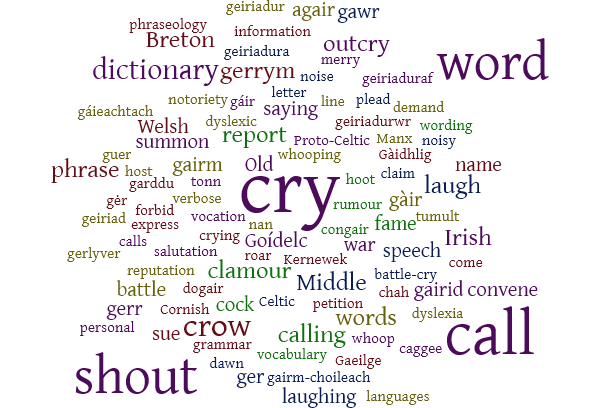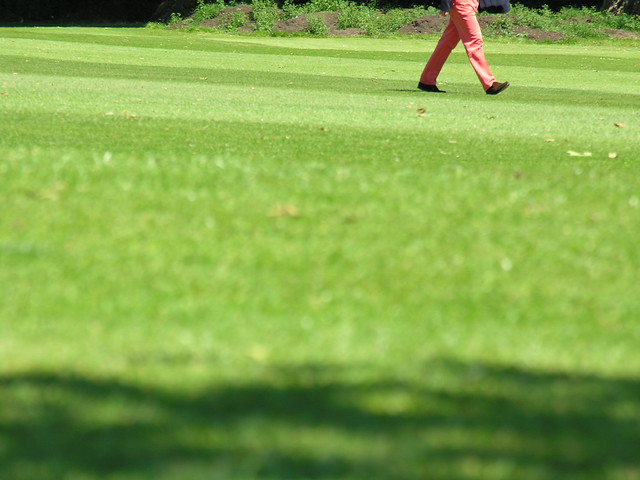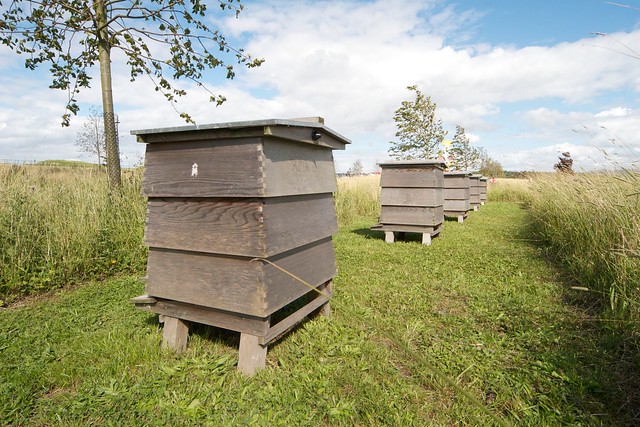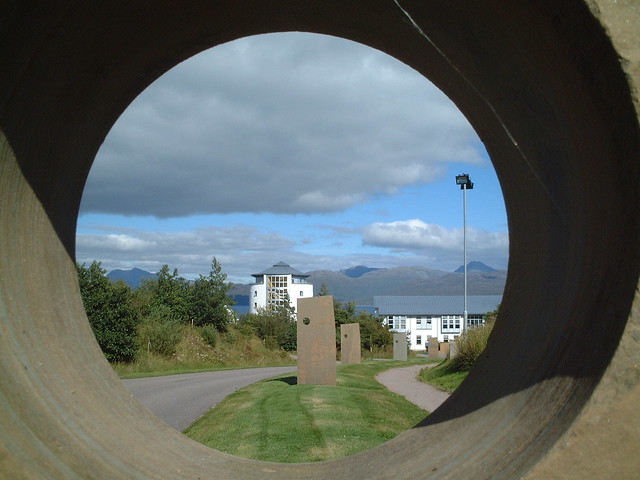Words for word, call, cry and related things in Celtic languages.

Word cloud created with WordItOut
Words marked with a * are reconstructions.
| Proto-Celtic |
*gāri = shout, call
*garyeti = to cry, shout
*gar(r)man- = cry, shout
*garyo- = word, command
*garyos = call, cry |
| Gaulish |
*Garomaros / Garo-marus = personal name
adgarion = accuser (?) |
| Old Irish (Goídelc) |
gairm = call, name, summons
gairid [ˈɡarʲiðʲ] = to call, cry out, summon
adgair [aðˈɡarʲ] = to summon
congair [konˈɡarʲ] = to call, summon; invite
dogair = to call |
| Middle Irish (Goídelc) |
gairm = call, name, summons, cry, name, title, calling, employment, profession
gairid = to call |
| Irish (Gaeilge) |
gáir [ɡɑːɾʲ/ɡæːɾʲ] = cry, shout; report, fame, notoriety; to cry shout; laugh
gáire = to laugh
gáieach = laughing, smiling
gáieachtach = noisy, vociferous; laughing, merry
gairm [ˈɡaɾʲəmʲ/ˈɡɪɾʲəmʲ] = call, calling, acclaim
(an tuiseal) gairmeach = vocative (case)
gairmí = professional
gairmiúil = vocational, professional
slua gairm = slogan |
| Scottish Gaelic (Gàidhlig) |
goir [gɤrʲ] = to call, cry, hoot, crow
gàir [gaːrʲ] = to laugh, cry shout; outcry, shout, clamour
gàir nan tonn = the roar of the waves
gairm [ɡɤrʲɤm] = calling, crying, call, cry, announcing, declaring, convenning, call of the cockerel
gairmeachadh = (act of) calling
gairm-choileach = cock-crow
gairm-chatha, gairm-chogaidh = war-cry
sluagh-gairm = slogan
tuiseal gairmeach = vocative case |
| Manx (Gaelg) |
gerr = crow, shout
gerr chah = war cry
gerrym = crowing, outcry, shouting, whoop, whooping, (cock) crow), avocation, mission, profession, vocation
gerrymagh = vocative
gerrymoil = professional, vocational
gerrym caggee = battle cry, call up, war cry
gerrym chellee = cock crow
sleih gerrym = slogan |
| Proto-Brythonic |
*gėr [ɡe̝ːr] = word, speech |
| Middle Welsh (Kymraec) |
geir = word
gaur, gawr = shout, cry
garddu = groan
garym, garm = shout, cry, outcry, clamour
garymleis, garamleis = scream, clamour |
| Welsh (Cymraeg) |
gair [ɡai̯r] = word, speech, phrase, greeting, salutation, short exhortation, saying, proverb; verb; line of poetry, verse; report, rumour, information, letter, reputation, fame, praise
geiriad = wording, phraseology, phrase
geiriadaf, geiriadu = to word, phrase, express
geiriadur = dictionary
geiriaduraf, geiriaduro, geiriadura = to compile a dictionary
geiriaduriaeth, geiriaduraeth = lexicography; vocabulary; grammar
geiriadurwr = lexicographer, dictionary-maker
geiriog = wordy, verbose
garm = shout, cry, outcry, clamour
garmlais = scream, clamour |
| Middle Cornish (Cernewec) |
garm = a cry, shout, outcry
garme = to shout, raise a shout, cry aloud, cry out |
| Cornish (Kernewek) |
ger [ɡɛːr/ɡeːr] = word, saying, report
gerdhal = dyslexic
gerdhalni = dyslexia
gerlyver = dictionary
garm = to shout, whoop, yell
garm argemynna = (advertising) slogan
garm vresel = battle cry
garm wormola = ovation
garma = to cry out, whoop, yell
garma yn lowen = to cheer |
| Old Breton |
gerent = word. say |
| Middle Breton |
guer = word
garm = loud crying, yelping of a fox, war cry, cry
garmadeg, garmadenn = clamour
garmer = to cry, crying, brawler
garmiñ = to cry, bellow, yelp |
| Breton (Brezhoneg) |
ger [ɡeːr] = word
geriadur = dictionary
garm = cry, clamour, weeping |
Etymology: from the Proto-Indo-European *ǵeh₂r- (to shout, call) [source]. The English words garrulous (excessively talkative), care and charm (sound of many voices (esp. of birds or children), a flock or group (esp. of finches)) come from the same PIE root [source].
| Proto-Celtic |
*woxtlom = dispute |
| Old Irish (Goídelc) |
focul [ˈɸokul] = word |
| Middle Irish (Gaoidhealg) |
focal, foc(c)ull, focla, facul = word, vocable, phrase, estimate, award, judgement, promise |
| Irish (Gaeilge) |
focal [ˈfˠɞkəl̪ˠ/ˈfˠɔkəlˠ] = word, phrase, remark, observation, saying, intelligence, message, promise, assurance
focalhbhá = ellipsis …
foclach = wordy, verbose
foclachas = wordiness, verbiage
focleolaí = philologist
focleolaíoch = philological
focleolaíocht = philology
foclóir = dictionary, lexicon, vocabulary
foclóireacht = lexicography
foclóireolaíocht/strong> = lexicology
foclóirí = lexicographer
foclóirín = word-list, vocabulary |
| Scottish Gaelic (Gàidhlig) |
facal [faxgəl̪] = word, comment, remark
facal air an fhacal = word for word, literally, verbatim
facal-faire = password
facal-fhreumhail = etymology
facal-mùirne = an endearment
facal-toisich = introduction, preamble |
| Manx (Gaelg) |
fockle [ˈfɔːɡəl] = word, charm, vocable
focklagh = wordy, verbose, voluble, loquacious
focklaghys = wordiness, verbiage
fockleyr = dictionary, lexicon, thesaurus
fockleyragh = lexicographic
fockleyreen = vocabulary, wordbook
fockleyreyder = lexicographer
fockleyrys = lexicography |
| Proto-Brythonic |
*gwoɨθl = dispute |
| Middle Welsh (Kymraec) |
gwaethyl = debate, dispute, contention, battle
gwaethyl uann, gwaethyluann = loud in dispute, strenuous, striving
gwaethyl gwyr = fighter, warrior |
| Welsh (Cymraeg) |
gwaethl = debate, dispute, contention, battle
gwaethlfan = loud in dispute, strenuous, striving
gwaethlwr = fighter, warrior
gwaethl = |
Etymology: from Proto-Indo-European *wókʷtlom, from *wekʷ- (to speak, sound out) [source]. Words from the same PIE roots include advocate, epic, vocal, voice, vouch and , vowel in English; gewagen (to report, notify) in Dutch; voce (voice, call, word) in Italian; and उक्ति (ukti – saying, expression) in Hindi [source].
| Proto-Celtic |
*brētrā = word, battle |
| Old Irish (Goídelc) |
bríathar [ˈbʲrʲiːa̯θər] = word, speech, utterance, verb, discourse |
| Middle Irish (Gaoidhealg) |
bríathar, briathor = word, utterance, talk, saying, speech, discourse, blessing, prayer, curse, promise, vow, pledge, verb
bríathardae = wordy, verbal
bríatharach = wordy, verbose
bríathad = act of speaking
bríatharaigid = to speak, pronounce |
| Irish (Gaeilge) |
briathar [ˈbʲɾʲiəhəɾˠ / ˈbʲɾʲiːhəɾˠ] = word, verb
briathartha = verbal
briathrach = wordy, verbose
briathrachas = wordiness, verbosity
briathraíocht = diction |
| Scottish Gaelic (Gàidhlig) |
briathar [brʲiəhər] = word, term
briathrail [brʲiəral] = loquacious, talkative, wordy, verbose
briathrach [brʲiərəx] = talkative, loquacious, wordy, verbose |
| Manx (Gaelg) |
breear = verb
breearagh = verbal |
| Middle Welsh (Kymraec) |
brwyder, brwydyr = battle
brwydraw = to battle, fight, struggle, attack
brwydrin = battle, conflict, fierce, pugnacious
brwydyrdaer = resolute in battle, fighting with all one’s might
brwytyrgar, brwydyrgar = delighting in fighting, eager for battle, bellicose
brwydryar = tumult of battle, battle-cry
brwydr-wr = fighter, warrior, combatant |
| Welsh (Cymraeg) |
brwydr [ˈbrʊɨ̯dr / ˈbrʊi̯dr] = pitched battle, conflict, attack, campaign, struggle, bother, dispute, controversy, host, army
brwydrin = battle, conflict, fierce, pugnacious
brwydro = to battle, fight, struggle, attack
brwydrwr = fighter, warrior, combatant |
Etymology: possibly from Proto-Indo-European *bʰerH- (to strike, pierce) [source]. Words from the same PIE root include boren (to) bore in English, (to drill) in Dutch, and foràre (to pierce, puncture) in Italian [source].
| Proto-Celtic |
*galw-o- = call |
| Old Irish (Goídelc) |
gláed = shout, loud call
gláedach = noisy, blustering, adjective
gláedid = to cry out, name; verb
gláedem = wolf
glegrach = noisy |
| Middle Irish (Gaoidhealg) |
gláed, glaid = shout, loud call
gláedach = calling, crying out, shouting, noisy, blustering
gláedid = to cry out, to name
glegrach = noisy, resounding, clamorous |
| Irish (Gaeilge) |
glao [ɡl̪ˠeː/ɡlˠiː] = call, shout
glaoch = calling, to call
glaoigh = to call, cry out, shout
glaoiteach = calling, vociferous
glaomaire = loud-mouthing, vociferous, boastful person
glaomaireacht = shouting, bragging, boastfulness |
| Scottish Gaelic (Gàidhlig) |
glaodh [gl̪ˠɯː] = cry, shout, yell, proclamation
glaodhach [gl̪ˠɯː.əx] = crying, shouting, yelling
glaodhaire [gl̪ˠɯː.ɪrʲə] = crier, loudspeaker
glaodhar [gl̪ˠɯː.ər] = noise, rattling, clang, clash
glaodhte = cried, shouted, yelled |
| Manx (Gaelg) |
gyllagh = calling, crying
gyllaghey = to cry, roar, shout |
| Proto-Brythonic |
*gėlwɨd = to call |
| Middle Welsh (Kymraec) |
galw = a call, calling, shout, cry, invitation
gelwi, galw, galwaf = to call, shout, bawl, summon, invite
galwedic, galwedig = called, named, summoned
galwedigaeth, galwedygaeth = call, a calling, vocation, profession, occupation |
| Welsh (Cymraeg) |
galw [ˈɡalu / ˈɡaːlu] = a call, calling, shout, cry, invitation
galwad = a calling, call, shout, sounding
galwaf, galw, gelwain = to call, shout, bawl, summon, invite
galwdig = called, named, summoned
galwdigaeth = call, a calling, vocation, profession, occupation
galwdigaethol = vocational, occupational, professional |
| Middle Cornish (Cernewec) |
galow = a call, invitation
gelwel, gylwel = to call (for), invoke, name |
| Cornish (Kernewek) |
galow = appeal, call, calling, invitation, vocation
galwansek = vocational
galwen = call
galwesigeth = calling, profession, vocation
galwesik = professional
gelwel = to call, appeal, invite, summon |
| Old Breton (Brethonoc) |
galu = appeal, summons |
| Middle Breton (Brezonec) |
galu = appeal, summons
gueruell, gueluer = to call, summon |
| Breton (Brezhoneg) |
galv [ˈɡalw/ˈɡalɥ/ˈɡalf] = appeal, summons
galvedigezh [ɡalveˈdiːɡɛs] = vocation, calling
galvel, galven, galver, gervel = to call, summon |
Etymology: from the Proto-Indo-European *gal(o)s- (voice, cry). The English word call comes from the same PIE root, as do galsas (sound, echo) in Lithuanian, голос [ˈɡoɫəs] (voice, word, remark, vote) in Russian, hlas (voice, vote) in Czech, and gallo (rooter, cockerel) in Spanish [Source].

Sources: Wiktionary, Am Faclair Beag, Online Manx Dictionary, Teanglann.ie, eDIL – Electronic Dictionary of the Irish Language, In Dúil Bélrai English – Old Irish glossary, Geiriadur Prifysgol Cymru, Gerlyver Kernewek, Dictionaire Favereau, TermOfis, English – ProtoCeltic WordList (PDF), Etymological Dictionary Of Proto Celtic













